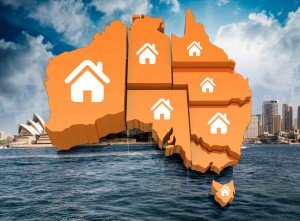The latest housing finance figures released by the Australian Bureau of Statistics show that the slashing of the cash rate has had an immediate impact on home loans.
It looks as though credit is beginning to flow again, with owner-occupier commitment up 11.9% the 3 months to August, and investor commitments up by 11.6%
But the results were a mixed bag with the number of owner-occupier loan approvals undershooting expectations but another strong gain in the total value of investor loans.
To help us understand what these results and their implications I spoke with Dr. Andrew Wilson, Australia’s leading housing economist and chief economist of MyHousingMarket.com.au
KEY POINTS
- In seasonally adjusted terms, lending commitments to households rose 3.2% in August 2019, following a 4.3% rise in July.
- The rise in lending to households was driven by refinancing of household loans (up 7.7%), followed by investment dwellings excluding refinancing (up 5.7%) and owner occupier dwellings excluding refinancing (up 1.9%).
- In through-the-year terms, the value of new lending commitments is down 13.0% for investment dwellings excluding refinancing and 1.7% for owner occupier dwellings excluding refinancing on August 2018 levels.
- In trend terms, new lending commitments rose for owner occupier dwellings excluding refinancing (up 1.5%) and for investment dwellings excluding refinancing (up 1.6%) in August 2019.
- The number of lending commitments to owner occupier first home buyers rose 5.2%, while the number of lending commitments to non-first home buyers fell 0.7% in seasonally adjusted terms.
- Lending to households for refinancing rose 7.7% in seasonally adjusted terms. Refinancing of owner occupier dwellings was the largest contributor to the rise in August (up 8.4%), followed by refinancing of investment dwellings (up 6.1%) and refinancing of personal loans (up 7.9%).
- Personal finance excluding refinancing fell 2.2% in seasonally adjusted terms in August 2019 and is down 17.8% on August 2018.
- In trend terms, the value of lending commitments to businesses fell 2.0% in August 2019 and is down 5.3% on August 2018.
- The number of owner-occupier loans rose 0.7% in the month, considerably softer than the consensus forecast of a 2.3% gain but following a robust 4.4% increase in July and broadly consistent with a consolidating upturn. Approvals are down –5.1%yr but have now risen 5.9% from their April low.
- The value of investor loans posted a much stronger 5.7% gain in the month following a 4.2% rise in July to be up over 10% in just two months, albeit still 13% below the levels seen a year ago.
- The total value of owner-occupier and investor loans rose 2.9%mth, –5%yr.
- All of the major states recorded gains in the total value of loans, led by Vic (+4.8%mth, –3.9%yr); and Qld +3.7%mth, –5%yr); with smaller gains in WA (+2.2%mth, +1.9%yr); NSW (+1.8%mth, –8.1%yr); and SA (+1.6%mth,–2.7%yr). Notably, the strong rise in investor loans is being led by a surge in Vic and Qld (both up 19.1% sinceMay) with more muted gains in NSW (+6.8% since May).
- The number of first home buyer approvals also consolidated, our estimates pointing to a 1% rise this month after a 10% jump in July.
- Construction-related finance approvals were more mixed, finance for construction up just 0.3%mth, –7.9%yr – suggesting some residual weakness for non high rise dwelling approvals near term – but finance for the purchase of newly built dwellings up a further 2.7% after an 8.7% jump in July. This measure includes those raising finance to settle 'off the plan' purchases of recently completed high rise developments. It had been one of the weakest segments up until the July bounce.
- Overall, the picture from finance approvals is consistent with the upturn in auction market activity, prices, and turnover and looks likely to carry into the months ahead. The main note from the data is that the turnaround is being driven by both owner-occupiers and investors – although the latter is coming from a much weaker starting point having been the main driver of the preceding downturn.






















